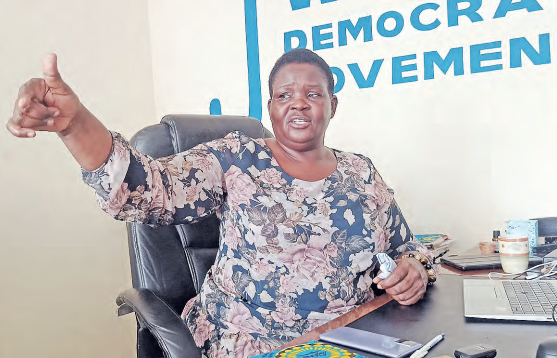

Her bubbly, happy-go-lucky personality hides the years of betrayal, pain and grief that have punctuated her life. Millicent Odhiambo has been through it all and nothing shocks her anymore.
She has seen her business empire grow only to come crashing down after betrayal from her trusted business partners.
She has lived through what she strongly suspects was the murder of her husband in 2005 by civil servants out to keep their dirty dealings under the radar.
“It has not been easy. He left me with three young children then, still in primary school. But thank God I raised them to the higher levels of learning, became adults, got married and are now independent,” she says.
Last November, she was hit by the biggest blow yet in her life, one she says will take decades to recover from if at all she will.
It was the sudden and inexplicable death of her daughter who had in June last year graduated with a Masters degree in Procurement from the Jomo Kenyatta University of Agriculture and Technology, and was already thinking of doing her PhD because she had secured a well-paying job.
“While I’m away in Uganda, I receive a call that my daughter went to sleep and never woke up,” she says. “That was the darkest day of my life. It was and still is very painful.”
Odhiambo is not your ordinary woman. She embodies the strength of a woman and demonstrates that women can take on roles done by men and do a good job.
She is a jack of all trades who has managed to balance between the demands of family, business, politics, religion and activism.
She is a physiotherapist and a psychologist by profession.
“I am a mother and grandmother, an astute politician and a human rights activist,” she says as the image of Wiper party leader Kalonzo Musyoka hangs behind her in her office.
She is the coordinator of Wiper party in Mombasa County.
“Actually, human rights activism is what brought out the politician in me,” she says, having rubbed shoulders with the high and mighty in Kenya’s political scene.
Odhiambo is also an evangelist passionate about family life. She loves sports having been one of the greatest volley-ballers in the country during her days at Kisumu Girls High School.
She is a fellow of the Master’s Institute of Technology from Australia having earned her fellowship because of her engagement with society.
Odhiambo is also the vice president of Ateker International Development Organization Network International.
“We bring back Africans who had been taken as slaves back home. We have a reconnection programme and we also have a reparation programme where we strive to ensure that Africans who had been taken as slaves are compensated by the persons who had taken them,” Odhiambo says.
“We know that in the states, the Red Indians were repatriated and given money to compensate for the land which was taken from them. Africa has never been compensated,” she says.
AIDO Network International is based in London and Odhiambo is the VP in charge of East Africa. Odhiambo also serves as the chief commissioner of Global Africa Diaspora Kingdoms.
“As we speak, my other name in the other world is Queen Mother Millicent Adhiambo Nabura. I am a royal at the level of Queen Mother. I was installed in the Ateker Kingdom and the Iluana Kingdom in Kenya.
“We are using culture as a vehicle for development and change. We are trying to bring culture in a different perspective, not just dancing,” she says.
So far, she says, they have seen many children go to school and they have supported hospitals.
“Currently in Uganda, we are working on building a pediatric hospital because when we visited we realised they are congested,” she says.
As a human rights activist before joining politics, she was the first CEO of Mombasa Citywide Residents Organisation, which brought together the residents of Mombasa to champion for their welfare and create an enabling environment to live in and do business.
This was due to the need to have
residents associations embedded in
governance systems of each county.



